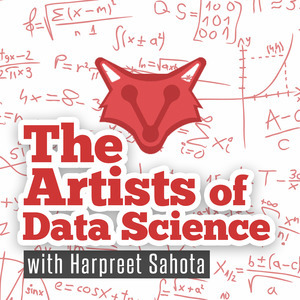Explaining Humans | Camilla Pang
September 3rd, 2020
59 mins 40 secs
Season 5
Tags
About this Episode
On this episode of The Artists of Data Science, we get a chance to hear from Camilla Pang, a scientist specializing in translational bioinformatics.
At the age of eight, she was diagnosed with autism spectrum disorder and struggled to understand the world around her and the way people were.
Her book, “Explaining Humans:What science can teach us about life, love, and relationships” is an original and incisive exploration of human nature and the strangeness of our social norms.
Camilla shares with us her journey into science, and her mission to understand human behavior at a young age. She also discusses the potential impacts of machine learning and A.I within the next few years, and the importance of understanding the nuances in data scientists that create individuality.
WHAT YOU'LL LEARN
[7:18] Potential negative impacts of A.I
[17:00] Learning to embrace errors
[38:11] Getting over the perfectionist mindset
[39:30] Important soft skills you need to cultivate
[44:17] Advice for women in STEM
QUOTES
[6:59] “...before we get on to making the most of A.I we first need to make the most out of human minds.”
[17:20] “an error in one context is a solution in the next”
[47:10] Don’t judge yourself for thinking outside the box. Stay true to yourself and your vision.
[55:23] “...just because you don't fit in a system, doesn't mean you weren't born to make a new one.”
FIND CAMILLA ONLINE
LinkedIn: https://www.linkedin.com/in/camilla-pang-8b177b69/
Instagram: https://www.instagram.com/millie_moonface/
Twitter: https://twitter.com/millzymai
SHOW NOTES
[00:01:32] Introduction for our guest
[00:02:59] A large, open-ended question.
[00:04:32] What you think the next big thing in machine learning is going to be in the next two to five years,
[00:06:08] What do you think would be the biggest positive impact on society?
[00:07:04] What do you think would be scariest applications of machine learning in the next two to five years?
[00:07:51] What do you think separates the great Data scientists from the merely good ones?
[00:09:47] Talk to us about the terms neurotypical and neurodiverse. Would you mind defining these terms for our audience?
[00:11:29] What does it mean to think in boxes and what does it mean to think in trees?
[00:14:59] Why are most people stuck in box thinking?
[00:15:49] How to be a tree thinker
[00:16:50] What can we do to start embracing errors in our own lives?
[00:19:27] What do proteins have to do with personality and interpersonal relationships?
[00:20:50] How could we use this understanding of proteins to be better colleagues and better teammates at work?
[00:23:09] Never let your fear define your fate
[00:25:16] Gradient descent in layman’s terms
[00:26:47] How to use gradient descent to find our path to prioritize and identify our goals?
[00:28:37] How can we use Bayes Theorem for empathy and managing the relationships that we have with ourselves?
[00:31:02] What neural nets can teach us about ourselves
[00:32:17] Is data science an art? Or is it a science?
[00:33:30] How does the creative process manifest itself in Data science?
[00:35:11] How to take better notes
[00:37:26] How to stop being a perfectionist
[00:39:10] Why soft skills are hard work
[00:42:54] We’re both INFJ’s!
[00:44:26] Advice for women in STEM
[00:46:21] What can the Data community do to foster the inclusion of women in Data science and AI and STEM?
[00:47:00] What's the one thing you want people to learn from this story?
[00:48:37] The lightning round

